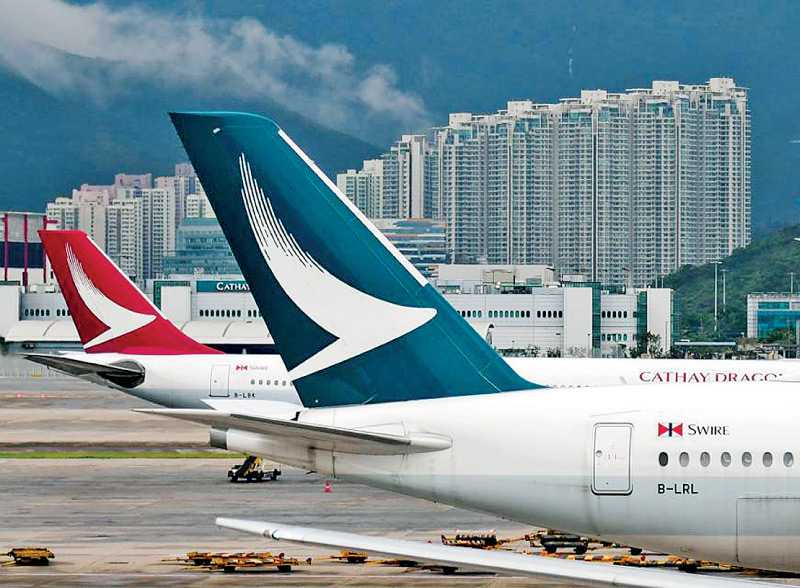Monday Feb 23, 2026
Monday Feb 23, 2026
Thursday, 22 October 2020 03:50 - - {{hitsCtrl.values.hits}}

SYDNEY (Reuters): Hong Kong’s Cathay Pacific Airways Ltd. said yesterday that it would slash 5,900 jobs and end its regional Cathay Dragon brand, joining peers in cutting costs as it grapples with a plunge in demand due to the coronavirus pandemic.
The airline would also seek changes in conditions in its contracts with cabin crew and pilots as part of a restructuring that would cost HK$ 2.2 billion ($ 283.9 million).
Overall, it will cut 8,500 positions, or 24% of its normal headcount, but that includes 2,600 roles currently unfilled due to cost reduction initiatives, Cathay said.
“The actions we have announced today, however unpalatable, are absolutely necessary to bring cash burn down to more sustainable levels,” Cathay Chairman Patrick Healy told reporters.
Cathay shares jumped almost 7% during early trading and closed 2.3% higher, with broker Jefferies saying the announcement removed a key overhang on the stock.
Singapore Airlines Ltd. and Australia’s Qantas Airways Ltd. have already announced similarly large payroll cuts, as the International Air Transport Association forecasts passenger traffic will not recover until 2024.
Cathay, which has stored around 40% of its fleet outside Hong Kong, said on Monday it planned to operate less than 50% of its pre-pandemic capacity in 2021.
After receiving a $ 5 billion rescue package led by the Hong Kong government in June, it had been conducting a strategic review.
The airline said it was bleeding HK$ 1.5 billion to HK$ 2 billion of cash a month and the restructuring would stem the outflow by HK$ 500 million a month in 2021, with executive pay cuts continuing throughout next year.
Cathay will postpone the delivery of its 21 Boeing Co 777-9 jets on order beyond 2025, Healy said.
The decision to end regional brand Cathay Dragon is in line with rival Singapore Airlines’ pre-pandemic move to fold regional brand Silkair into its main brand, though in this case 2,500 Cathay Dragon pilots and cabin crew will lose their jobs.
Cathay Dragon, once known as Dragonair, operated most of the group’s flights to and from mainland China and had been hit by falling demand before the pandemic due to widespread anti-government protests in Hong Kong.
Plans to merge Cathay Dragon into Cathay’s main brand earlier this year hit roadblocks from China’s aviation regulator because of infractions during last year’s pro-democracy protests, two sources told Reuters in May.
Cathay said the airline would cease operating immediately and it would seek regulatory approval to fold the majority of Cathay Dragon’s routes in Cathay Pacific and low-cost arm HK Express.
Healy said there would be “substantial savings” from combining Cathay Dragon’s narrowbody fleet with Cathay Pacific’s longhaul fleet and focusing on marketing of a single premium brand.
In the short-term, the closure of the Cathay Dragon brand will result in it being unable to carry cargo to Fuzhou, Guangzhou, Kuala Lumpur and Fukuoka, and it will only send dedicated freighters to Xiamen, Chengdu and Hanoi, it told cargo customers in a memo, indicating the routes were cut for now.
Like Singapore Airlines, Cathay lacks a domestic market to cushion it from the fall in international travel due to border closures. In September, Cathay’s passenger numbers fell by 98.1% compared with a year earlier, though cargo carriage was down by a smaller 36.6%.
The airline’s share register is dominated by Swire Pacific Ltd., Air China Ltd., Qatar Airways and the Hong Kong government, with only a 12% free float.